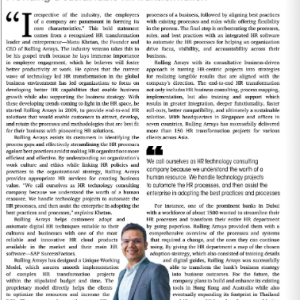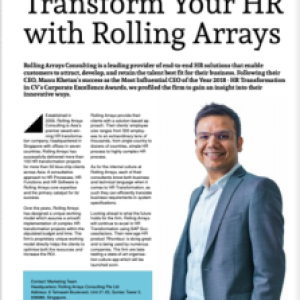A Take on Change Management by KM Birla
There is no “One Size Fits all” ?
[authorblog]
[postsociallinks]

We have a lot of emphasis that we draw with “Best Practices”, “Proven Methodologies”, “Standardization”, but I think it is all sometimes over rated. On one hand it does provide you a good direction for a fruitful journey, but on the other hand I believe it limits your reach and ability to innovate. “Best Practices” are good, but there are better practices existing which needs to be uncovered and that is what innovation is all about.
I just want to Quote an article in this post which I believe very well sums up the point and also provides a great deal of insight into Change Management.
Butter chicken at Birla
What succeeds at home may not work overseas. The chairman of Aditya Birla Group, Kumar Mangalam Birla, says Indian companies must be prepared to change long-held traditions if they are to thrive on the global stage.
Mahatma Gandhi was killed in my great-grandfather’s home. Near the end of his life, India’s founding father used to stay at Birla House when he came to Delhi, and in January 1948 an assassin shot him point-blank as he walked out into the grassy courtyard where he held his daily prayer meetings. The house and garden are now a shrine and museum, visited by tens of thousands of admirers every year.
Growing up, I hardly needed to visit the memorial to be reminded of the values held by my close-knit Marwari family. Our tiny community, originally from Rajasthan, has had spectacular success in business, in part because we have maintained tight familial relations and traditional values—including many of those promoted by Gandhi himself. Marwari traders apprenticed their sons to other Marwari firms, loaned each other money, and insured one another’s goods, confident that their partners held to these same codes. To some in the West, our ways probably looked old-fashioned: when I took over the company, in 1996, at age 29, after the sudden death of my father, no meat was cooked in Birla cafeterias; no wine or whiskey was served at company functions.
Seven years later, we bought a small copper mine in Australia. The deal wasn’t a huge one, worth only about $12.5 million, but it presented me with a unique challenge of the sort I had not yet faced as chairman. Our newest employees were understandably worried about how life might change under Indian ownership. Would they have to give up their Foster’s and barbecues at company events? Of course not, we reassured them.
But then several of my Indian managers asked why they should have to go meatless at parties, if employees abroad did not. At Marwari business houses, including Birla, the top ranks of executives traditionally have been filled with other Marwaris. I had introduced some managers from other firms and other communities, and they had a valid point. I was genuinely flustered. My lieutenants were relentless: I had never faced a situation where my own people felt so strongly about something. Yet at the same time, I knew vegetarianism was a part of our values as a family and as a company. A core belief! I had broken a lot of family norms, but I thought this one was going to be multidimensionally disastrous for me.
Fortunately, my grandparents merely laughed when I approached them with my dilemma: they understood better than I did that our company had to change with the times. If we wanted to make our mark on the world, we had to be prepared for the world to leave its mark on us.
The Aditya Birla Group is now one of India’s most globalized conglomerates. We have operations in 36 countries on five continents and employ 136,000 people around the world. Over 60 percent of our revenues come from overseas. In the 1970s, my father, frustrated by the heavy-handed and corrupt “license raj” at home, expanded widely in Southeast Asia. Since I took over as chairman, we’ve made a dozen acquisitions overseas, worth a total of more than $8 billion, in sectors as varied as mining, pulp, aluminum, and insurance. We’ve branched out into Australia, America, Canada, and Europe. For the moment, our top management remains all-Indian, even if not all-Marwari. But I would guess that within a decade, half of our most senior staff will be non-Indian.
We have expanded internationally for many reasons—sometimes to spread our bets, sometimes because we found it impossible to open a plant in India as fast and as cheaply as we could abroad. In each case, we’ve based our decision on whether or not the deal would increase shareholder value. Yet when I look around me, I see too many Indian companies eager simply to be written about as global players. Sometimes that clouds the fundamentals of making an overseas acquisition or having an overseas presence. To globalize for the sake of globalizing, as a matter of ego, is perilous. Expanding internationally is hard, risky work. And as I was reminded the first time I saw butter chicken being served in a Birla canteen, the most difficult challenges turn out to be the ones you least expect…….
Courtesy: http://www.mckinsey.com/insights/asia-pacific/butter_chicken_at_birla
Rolling Arrays is Asia’s premier award winning HR transformation company, headquartered in Singapore with offices in 6 countries. Since its inception in transformation projects for more than 50 blue-chip clients across Asia. A consultative approach to HR processes, HR functions and HR software is Rolling Arrays core expertise and the primary catalyst for its success.
[likeblogpostbutton] [sharethisbuttons]







